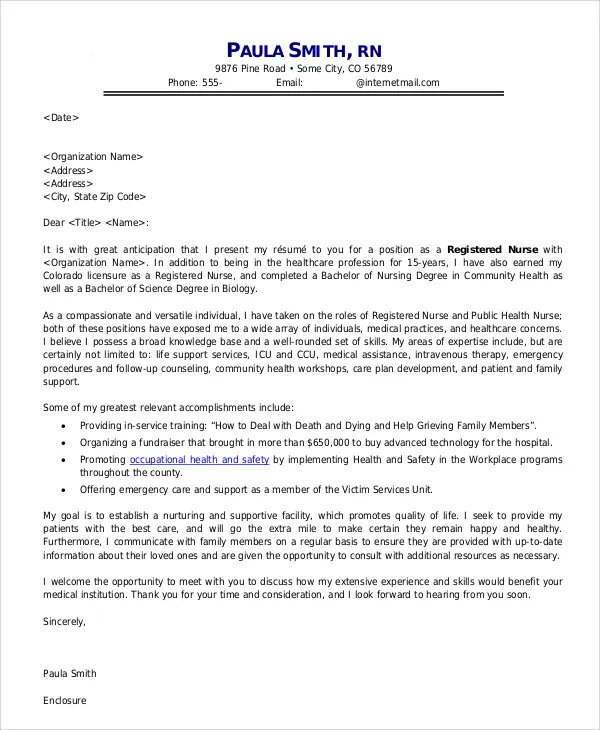Why a Stellar RN Cover Letter Matters
In the competitive world of nursing, securing your dream job as a Registered Nurse (RN) requires more than just a strong resume. A well-crafted cover letter is your first opportunity to make a lasting impression on potential employers and significantly increase your chances of getting hired. It’s your chance to showcase your personality, highlight your key skills, and demonstrate your genuine passion for nursing. Without a compelling cover letter, your application might be overlooked, even if you possess all the necessary qualifications. This guide will equip you with the knowledge and tools to create an outstanding RN cover letter that will help you stand out from the crowd and get you hired fast.
Understanding the Importance of a Cover Letter
A cover letter serves as a vital introduction, providing context to your resume and allowing you to express your enthusiasm for the specific nursing position. It’s your chance to tell your story, explaining why you are the ideal candidate and what makes you unique. The cover letter provides a space to highlight your key accomplishments and qualifications in a narrative form, connecting your skills and experience to the specific requirements of the job. Furthermore, it enables you to demonstrate your communication skills, writing style, and attention to detail, crucial attributes in the healthcare field. By using a tailored approach, you can show the hiring manager that you’ve done your research and are genuinely interested in their organization, something a generic application lacks.
How a Cover Letter Enhances Your Application
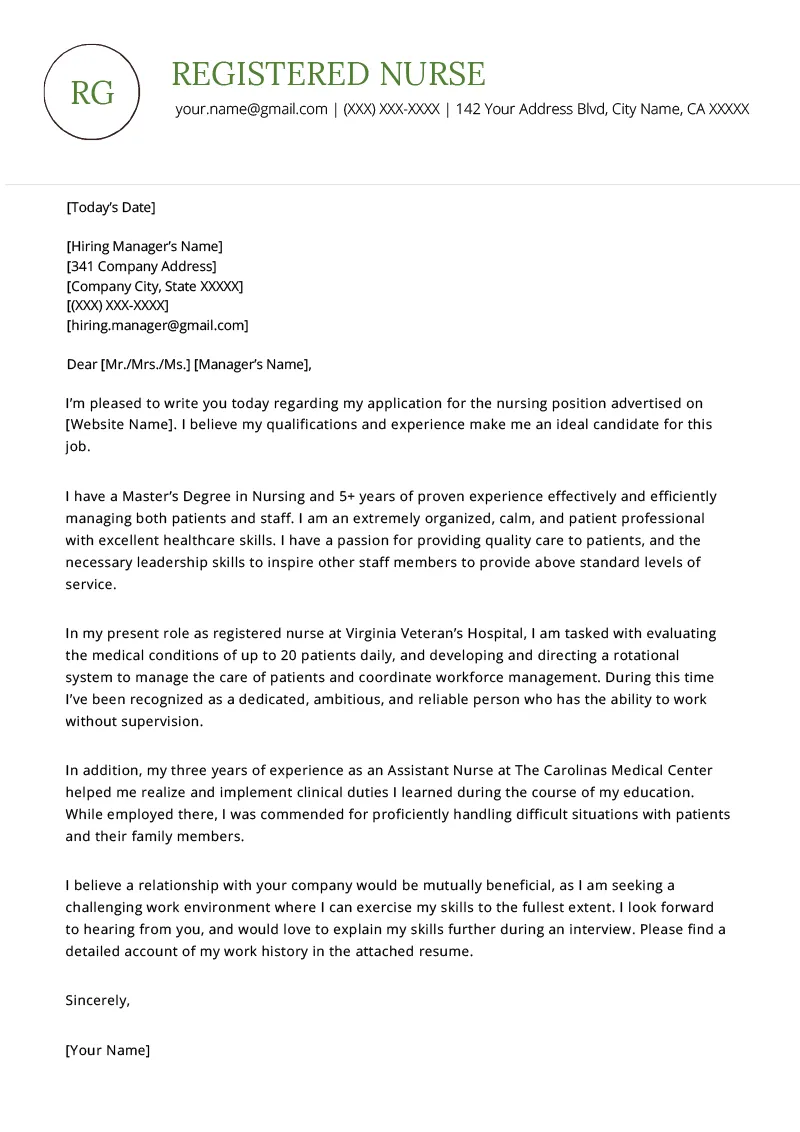
A cover letter elevates your application by personalizing it. It allows you to go beyond the basic information in your resume, providing a more in-depth look at your professional background and personal attributes. By addressing the specific needs of the employer, you demonstrate your understanding of the role and your ability to meet their expectations. A well-written cover letter highlights the specific skills and experiences that align with the job requirements. It allows you to expand on accomplishments and elaborate on how your previous roles have prepared you for the responsibilities of the position. Essentially, it provides the ‘why’ behind your resume, articulating why you are the best fit for the role and the organization.
Key Components of a Standout RN Cover Letter
A compelling RN cover letter should be well-structured and easy to read. It needs to clearly and concisely present your qualifications. Each section should serve a specific purpose, contributing to the overall effectiveness of the letter. The key elements include your contact information and the date, a professional salutation, a strong opening paragraph that grabs the reader’s attention, a body that highlights relevant skills and experiences, and a compelling closing with a call to action. A well-organized letter demonstrates your professionalism and attention to detail, critical qualities for any nurse. By including these components, you ensure that your cover letter not only provides the necessary information but also leaves a positive impression on the hiring manager.
Your Contact Information and the Date
Begin your cover letter with your full name, address, phone number, and professional email address. This information should be at the top of the page, typically left-aligned. Directly below your contact information, include the date you are sending the letter. This ensures the employer can easily reach you and understand when you applied. Ensure your email address is professional and easy to read, avoiding nicknames or unprofessional language. This initial section establishes the foundation of your communication, projecting professionalism and ensuring the employer can easily contact you if needed.
Crafting a Compelling Salutation
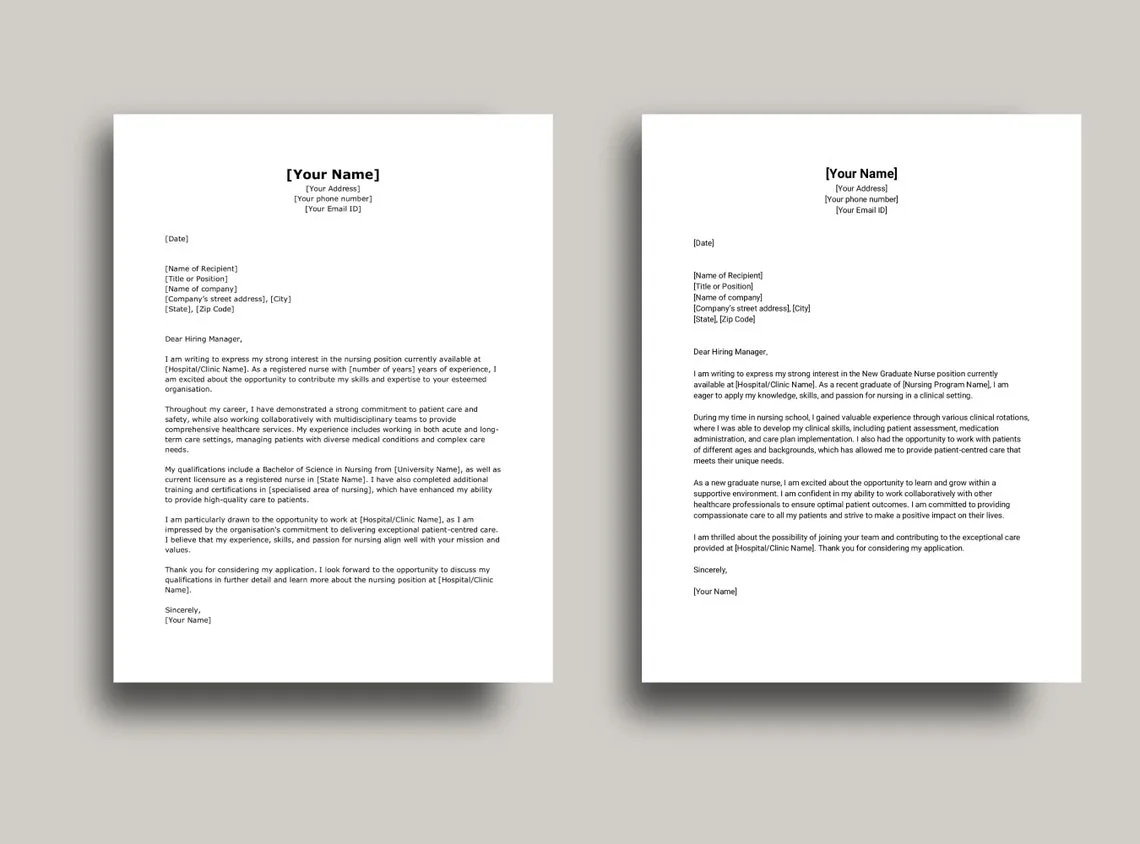
Addressing the hiring manager by name is a great practice. Research the name of the hiring manager or the person to whom you should address the letter. If you cannot find a specific name, use a professional greeting such as ‘Dear Hiring Manager’. Avoid generic greetings like ‘To Whom It May Concern’, as this shows a lack of personalization. A well-targeted salutation makes a positive first impression and indicates that you have taken the time to personalize your application. Using the correct name adds a personal touch, indicating that you are genuinely interested in the position and have done your homework.
Writing a Strong Opening Paragraph
The opening paragraph sets the tone for your entire cover letter. It should immediately grab the reader’s attention and express your enthusiasm for the position. State the specific job you’re applying for and where you found the posting. Briefly highlight why you are interested in the role and the organization. Mentioning any connection you have with the hospital or clinic, such as a personal experience or a referral, can be a great way to establish rapport. The goal is to create a compelling introduction that encourages the reader to continue reading. Start with a strong statement that captures the reader’s interest from the beginning.
Highlighting Your Nursing Skills and Experience
The body of your cover letter is where you showcase your nursing skills and experience. Focus on the skills most relevant to the job description. Provide specific examples of how you have used these skills in previous roles. Quantify your accomplishments whenever possible. For instance, instead of saying you ‘provided excellent patient care’, state that you ‘reduced patient readmission rates by 15%’. Use action verbs to describe your responsibilities and accomplishments. Tailor each example to demonstrate how your experience aligns with the needs of the position. Emphasizing how you can contribute to the healthcare team is key to making a strong impression.
Showcasing Relevant Certifications and Licenses
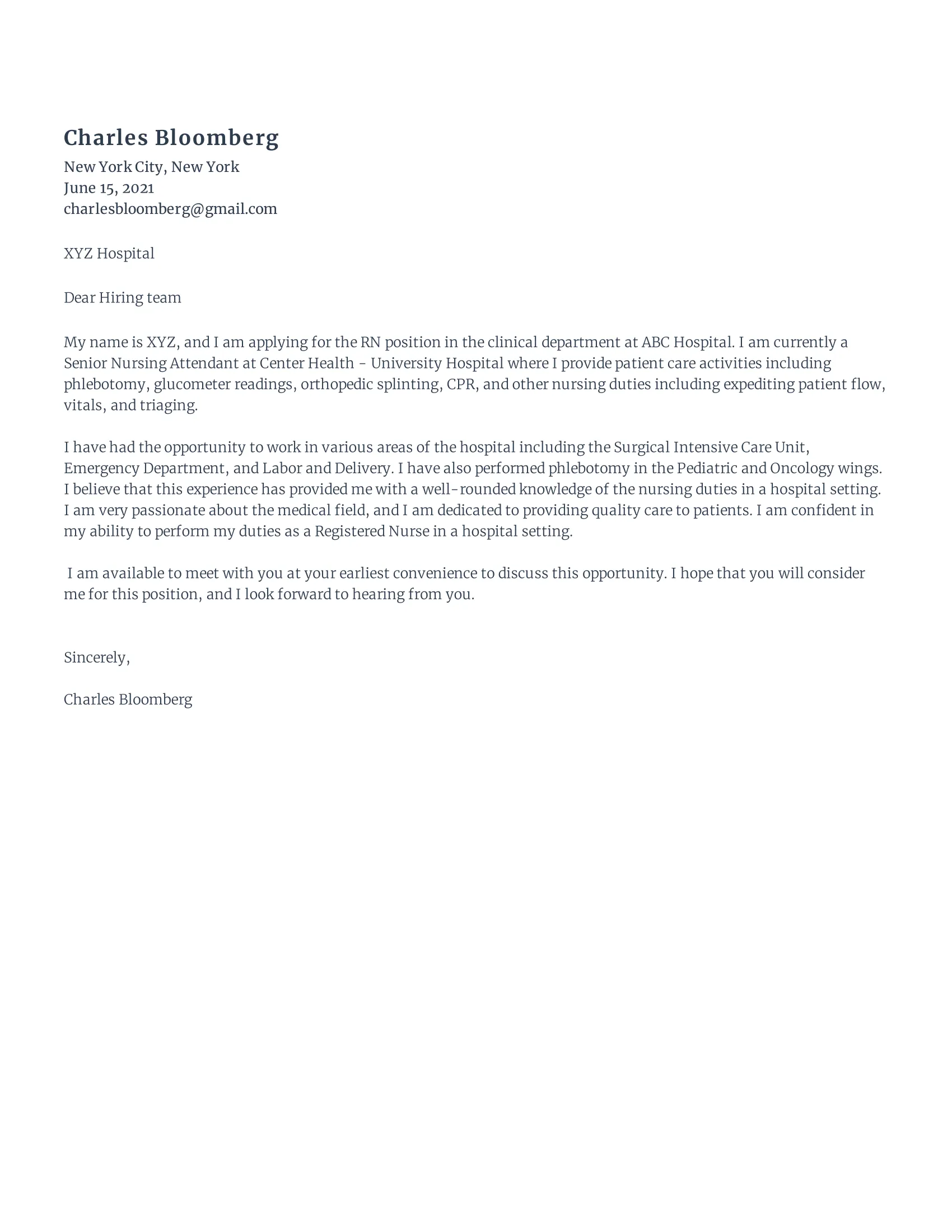
List all relevant certifications and licenses in your cover letter. Include the issuing organization, the date of certification, and the expiration date. This demonstrates your commitment to professional development and staying up-to-date with industry standards. Common certifications to include are BLS (Basic Life Support), ACLS (Advanced Cardiovascular Life Support), and any specialized certifications related to your field of nursing, such as critical care or emergency nursing. Clearly stating these credentials allows the hiring manager to quickly assess your qualifications. Making sure that your certifications are current is a must to be hired.
Quantifying Your Achievements in Nursing
Whenever possible, quantify your achievements. Numbers add credibility to your claims and help the hiring manager understand the impact of your work. Instead of saying you ‘managed patient care effectively’, provide specifics such as ‘managed a team of nurses caring for 20 patients daily’. Use numbers and statistics to demonstrate your achievements. This could include reducing patient falls, improving patient satisfaction scores, or decreasing medication errors. Quantitative data provides concrete evidence of your skills and accomplishments, setting you apart from other applicants. Include metrics like percentages, figures, and statistics to make your accomplishments more tangible and impressive.
Demonstrating Your Passion for Nursing
Express your passion for nursing. This is your chance to communicate why you are drawn to this profession and what motivates you to provide excellent patient care. Share specific instances that highlight your dedication to nursing. Describe your philosophy of care and how you approach patient interactions. Mention any volunteer work, professional development activities, or special interests that showcase your commitment. Let your enthusiasm shine through and show the hiring manager what makes you unique. Demonstrating passion helps you connect on a personal level with the hiring manager and shows that you are not just seeking a job, but a fulfilling career.
Tailoring Your Letter to the Specific Job
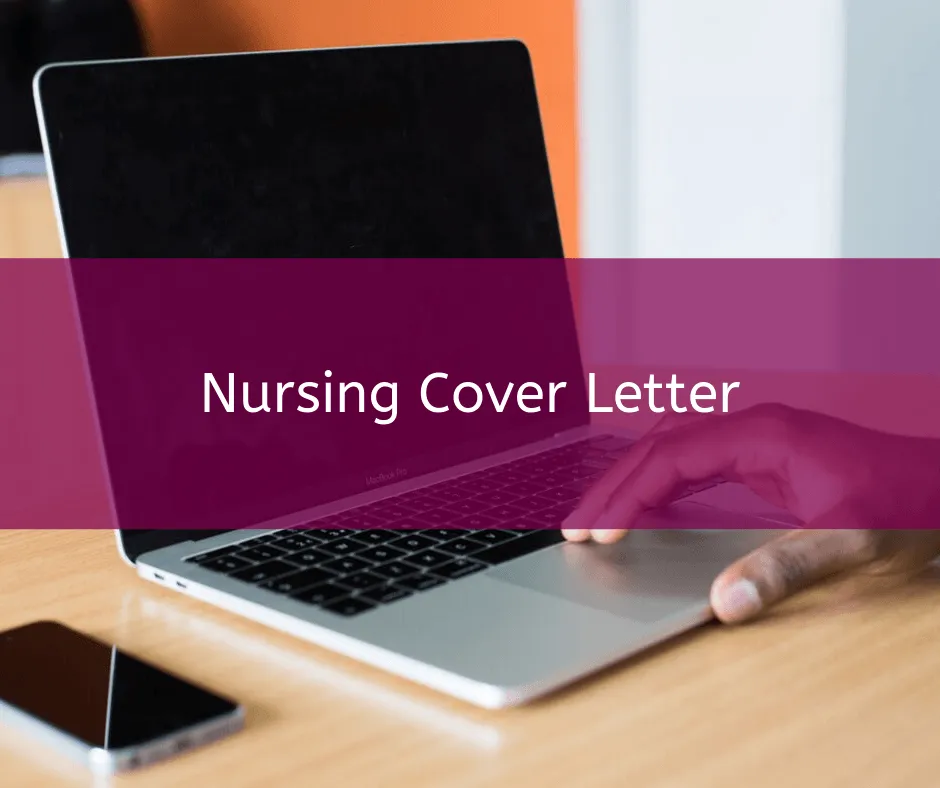
Customize your cover letter for each job application. Generic cover letters are easily recognized and less effective. Carefully review the job description and identify the key skills and requirements. Align your qualifications and experience with these requirements and highlight how you meet them. Mention the specific unit or department you are interested in working in, and why. Demonstrate that you understand the specific needs of the role and the organization. Tailoring shows the employer that you have taken the time to understand their requirements and are genuinely interested in the position. This personalized approach sets you apart from other applicants.
Researching the Hospital or Clinic
Before writing your cover letter, conduct thorough research on the hospital or clinic where you are applying. Visit their website, read about their mission and values, and learn about their services and patient care approach. Mentioning specific aspects of the organization that resonate with you demonstrates your interest and allows you to personalize your letter. If possible, identify any recent initiatives or achievements of the organization and reflect on how your skills and experience can contribute to their goals. Demonstrating this level of research shows the employer that you are invested in joining their team and aligned with their values.
Matching Your Skills to the Job Description
Carefully review the job description and identify the key skills and qualifications. The job description is essentially a list of what the employer is seeking in an ideal candidate. Your cover letter should mirror those requirements, highlighting where your skills align with the specific needs. Use keywords from the job description throughout your letter to show that you meet the required criteria. Provide specific examples of how you have demonstrated these skills in previous roles, illustrating that you are a strong match for the position. This targeted approach increases your chances of getting noticed and getting an interview.
Formatting Your RN Cover Letter for Success
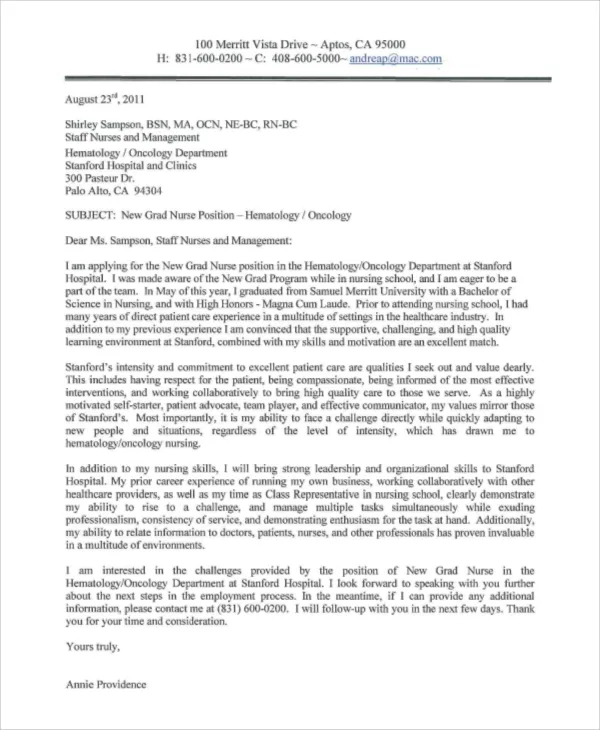
Proper formatting is crucial for presenting your cover letter in a professional and readable manner. Choose a clear, easy-to-read font such as Times New Roman or Arial, and keep the font size between 11 and 12 points. Use consistent margins and spacing. Use left alignment for text and avoid justifying the text unless absolutely necessary. Keep paragraphs concise and use bullet points or lists to break up large blocks of text. Make sure to review the formatting on different devices to ensure it is consistent. Formatting that is clean and professional demonstrates attention to detail and helps the hiring manager to easily read and understand your letter.
Choosing the Right Font and Font Size
Select a professional font such as Times New Roman, Arial, or Calibri. Ensure the font is easy to read. Keep the font size between 11 and 12 points. Avoid using unusual or overly decorative fonts, as they can distract the reader and detract from the professionalism of your letter. Consistency is key when formatting. Ensure all elements, including headings, body text, and lists, use the same font and size. This enhances the overall readability and creates a polished look. Ensure the text is clear and concise to facilitate reading.
Maintaining Proper Margins and Spacing
Use standard margins (1 inch on all sides) to provide adequate white space around your text. This prevents the letter from looking cramped and makes it easier to read. Use single spacing within paragraphs and double spacing between paragraphs. This improves readability. Make sure the spacing between the sections is consistent. Proper spacing and margins enhance the overall appearance and make your letter look polished and professional. Avoid making the document look cluttered, as it could deter the reader.
Proofreading Your Cover Letter Meticulously
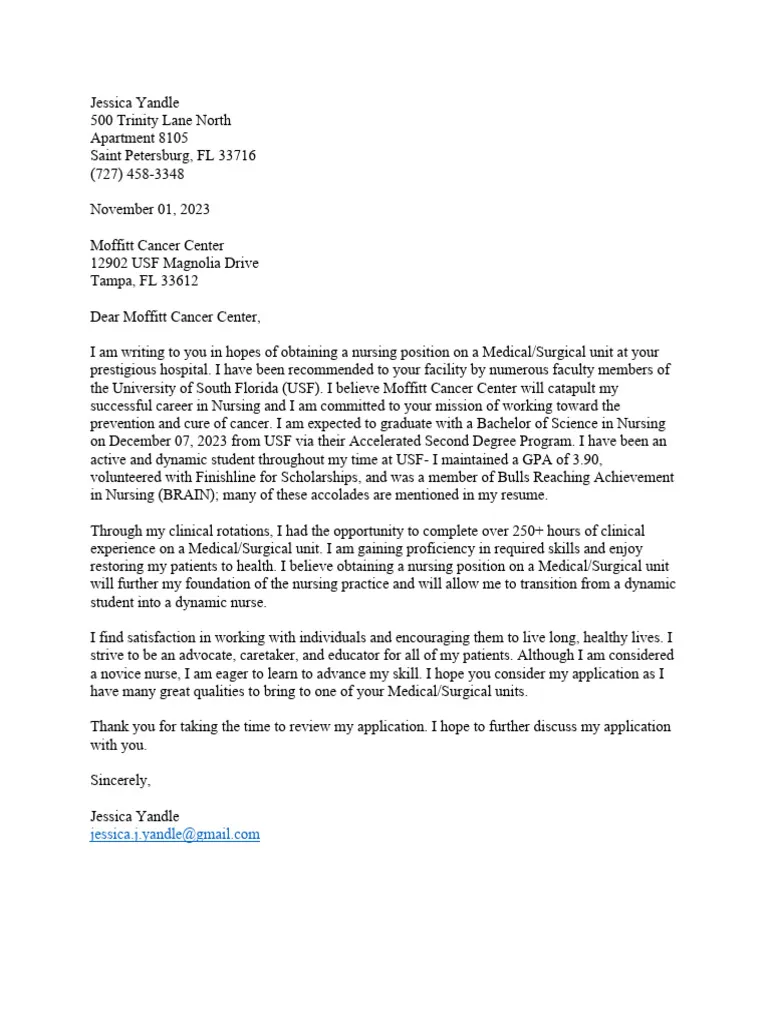
Proofread your cover letter multiple times to catch any errors. Even small mistakes can damage your credibility. Check for typos, grammatical errors, and punctuation mistakes. Read the letter aloud to hear how it sounds and identify any awkward phrasing. Consider having a friend or family member review your letter. They can offer a fresh perspective and catch errors that you may have missed. Proofreading is essential for presenting a polished, professional document. Double-check all the details, including the name of the hiring manager and the hospital name, before submitting.
Avoiding Common Mistakes in RN Cover Letters
Avoid making common mistakes that can detract from your application. Generic letters, typos, and incorrect salutations can be easily avoided with careful attention to detail. A well-written cover letter should highlight your unique qualifications and demonstrate your genuine interest in the position.
Generic and Vague Language
Avoid using generic and vague language. Phrases like ‘hardworking’ or ’team player’ are overused and don’t provide any specific information about your skills or accomplishments. Instead, use specific examples and quantify your achievements. For example, instead of saying, ‘I have excellent communication skills’, provide examples like ‘I successfully communicated with patients and their families to provide comprehensive care’. Specific details make a more compelling case and allow you to stand out from the other applicants.
Typos and Grammatical Errors
Typos and grammatical errors can damage your credibility and make your cover letter appear unprofessional. Always proofread your letter carefully and use spell-check. However, spell-check may not catch all errors, so it’s crucial to read your letter aloud. Enlist a second pair of eyes for an unbiased review. A mistake-free cover letter shows attention to detail, a critical skill in nursing. Take the time to ensure your letter is polished and professional.
Addressing the Letter Incorrectly
Make sure you address the cover letter to the correct person. Research the name of the hiring manager or the person to whom you should direct your letter. Incorrectly addressing the letter indicates a lack of attention to detail and a lack of interest. If you cannot find the name of the hiring manager, use a professional greeting, such as ‘Dear Hiring Manager’. Never use generic greetings such as ‘To Whom It May Concern’. Personalized greetings demonstrate you took the time to research the hospital or clinic.
The Art of the Closing and Call to Action
The closing paragraph should reiterate your interest in the position and express your gratitude for the reader’s time and consideration. Include a call to action, such as a statement that you look forward to hearing from them or are available for an interview. Restate how your skills and experience align with the job requirements. End with a professional closing such as ‘Sincerely’ or ‘Best regards’. Proofread the closing paragraph to ensure the tone is positive and professional. A strong closing paragraph leaves the hiring manager with a clear understanding of your interest and a reminder of your qualifications.
Expressing Gratitude and Offering Contact Info
Conclude your cover letter by expressing your gratitude for the hiring manager’s time and consideration. Thank them for reviewing your application and reiterate your interest in the position. Provide your contact information one last time, making it easy for them to reach you. This reinforces your professionalism and ensures the hiring manager can easily contact you if needed. A courteous closing is a small but significant detail. This leaves a positive impression and confirms that you are eager to move forward in the hiring process.
Examples of Effective RN Cover Letters
Reviewing example cover letters can give you a clear idea of how to structure your own. Adapt these examples to showcase your unique skills and experience. Here are three examples based on different scenarios.
Example 1 Recent Graduate
This example focuses on highlighting clinical rotations, any volunteer work, and relevant coursework. It emphasizes the eagerness to learn and the foundational knowledge gained. It includes strong statements about the aspiring nurse’s goals.
Example 2 Experienced Nurse
This example highlights previous roles, certifications, and accomplishments. It demonstrates a clear understanding of the nursing field. The language used is professional. The examples are quantifiable and describe the value brought to the patient care team.
Example 3 Nurse with Specialized Skills
This example focuses on specialized skills or certifications. It highlights proficiency in specific areas. The cover letter illustrates examples in which the nurse has improved outcomes and patient experience. It emphasizes the ability to contribute unique expertise.
